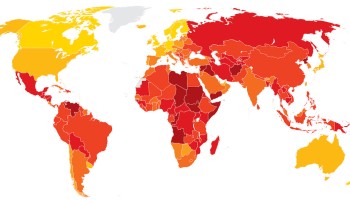Croatia is the second former Yugoslav nation to join, after Slovenia in 2004 and it has developed significantly since declaring independence in 1991. The EU admission process has prompted difficult social, political, and economic reforms, but there are those who believe it missed the mark on corruption.
The criticisms are reminiscent of the last EU expansion in 2007 which brought in Bulgaria and Romania.
A Lesson Learnt or Lost?
Both of those recent new members suffered from high levels of corruption despite requirements to strengthen the rule of law before admission. Corruption remains serious there. As proof, last month a politically connected but unqualified media mogul was appointed to head Bulgaria’s intelligence agency so quickly and with so little debate that questions about influence peddling and cronyism arose. Protesters called for the government to resign.
And in Romania, an ex-prime minister was jailed last year for stealing more than $1.9 million to fund a reelection campaign. The EU was “fully aware of all the deficiencies” in both Romania and Bulgaria prior to enlargement, says Duje Prkut, a researcher with GONG, a Croatian watchdog group. To counter them, the EU implemented a novel monitoring program intended to strengthen anti-corruption measures and the rule of law in both countries.
The so-called Cooperation and Verification Mechanism evokes mixed reactions. Detractors believe it has not stopped the stagnation of anti-corruption efforts. “I think that if [the EU] had a second opportunity they would spend much more time on rethinking if they should do this,” Prkut said. Others believe the mechanism has had a lasting positive impact. Monica Macovei, a member of the European Parliament and former Romanian justice minister, said the program, which she championed in 2007, has led to major successes. She pointed to Romanian politicians convicted for corruption as evidence.
A New Leaf or More of the Same?
To critics, the EU has done far too little to tackle corruption while Croatia has been under admission scrutiny and did not heed lessons that should have been learned from 2007. The problem was “purposefully ignored,” according to Natasha Srdoc, co-founder of the Adriatic Institute, a Croatian think tank. The EU shirked its responsibility to Croatia, she says.
"The accession process has not done what Croatian ordinary people expected.” She describes EU-initiated reforms to the rule of law, judiciary, and prosecution of political corruption as subpar.
Srdoc also noted statistics that point to more than $15 billion leaving Croatia through crime, corruption, and tax evasion. If that could be recovered Croatia would not need a foreign loan today, she said. Croatia’s most recent elections were marred by corruption, too. More than 1 million non-existent or illegal votes were cast in 2011, according to Srdoc. That is around 25 percent of Croatia’s entire population, which stands at slightly over 4 million. The Croatian government has pledged to cleanse the voter rolls.
Little has changed during the accession, though, according to Srdoc. Corruption is rampant throughout Croatia she said. “Three branches of government are held by the same types of crooks,” she added.
Croatia’s success fighting corruption, measured by a track record of high-level corruption cases, is inferior to Bulgaria and Romania’s in 2007, according to Macovei. “A lot of things are still on the table,” she said, but “there is no implementation.” Also some changes seem rushed or insincere. Croatia’s conflict of interest office was set up the same month as the EU’s final vote on its entry: February 2013. “There was no time to see how it was implemented,” Macovei said. The Croatian government passed a flurry of changes to the country’s laws just in time and in order to meet EU requirements.
EU officials did not respond to multiple requests for interviews for this story. They provided instead a general statement of the Union’s stance on corruption in the West Balkans.
It said that “Rule of law issues are central to the Commission’s enlargement policy.” The EU took pains to ensure the rule of law was adequately enforced; Croatia has made considerable gains in the anti-corruption arena, and has established “the necessary legal and institutional framework for the fight against corruption,” the statement read.
Unlike Bulgaria and Romania, Croatia will not be subject to post-admission monitoring. The protection of reforms already in place and the success of future reforms rest with Croatia itself. Macovei expressed her support for Croatia’s admission to the EU, but insisted that monitoring set up specifically for Croatia would be “to the benefit of the Croatian people...to the benefit of all Europeans, and to the benefit of the accession process itself.”
Her advice on that has been rejected. A new anti-corruption report including data on all EU member states will come out this year and include Croatia. It represents an alternative to special monitoring.
“Post-accession monitoring is an issue of the past,” Prkut said. “It seems to be much more fair and honest to say if some issue exists in [the] EU, let’s all deal with it in the same way.”
It is unclear if the report will lead to substantive consequences for member states.
Will it stick?
Everyone does agree, however, that with the loss of direct EU pressure, Croatia is on fragile ground.
One possibility is that Croatia will continue genuine attempts to reduce corruption, and Prkut is cautiously optimistic about the future. Civil society will have to hold politicians accountable, he said. The key will be making sure laws aren’t made “meek and weak,” he added. NGOs built credibility during accession and found ways to advise on policy. They will have to hold on to their newfound influence if changes are to last, Prkut said.
The alternative for Croatia is stagnation or even reversion. Macovei sees it likely the ability to address high-level corruption will be severely limited once Croatia is in the EU. Corrupt politicians will not pass legislation against themselves without the push that the accession process provided, she said. “After accession they will defend themselves. It’s human nature, we have to admit it.”
Three other Balkan countries: Serbia, Macedonia, and Montenegro are candidates for EU admission. All face serious rule of law issues. If they are to gain entry, corruption and rule of law reforms will be essential. In a shift, the EU will focus future accessions on these issues first. This is meant to give countries more time to put changes into effect and develop a track record before admission.
Bulgaria and Romania provided the first push for change, but Croatia’s accession has cemented the need to do something different, Prkut said.
Macovei noted that this might help future candidates establish more lasting change before joining the EU, but comes too late for Croatia.





